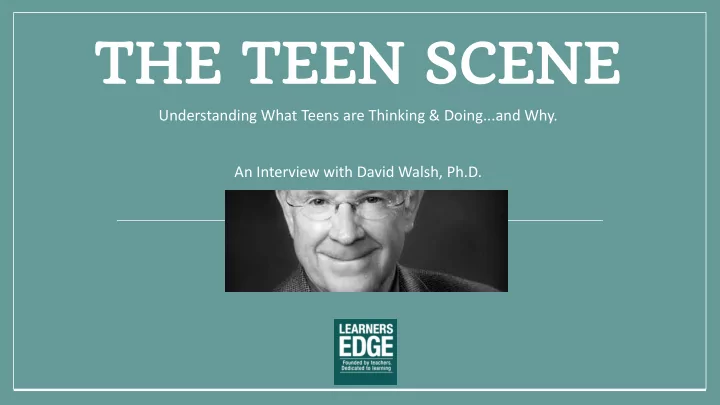

THE THE TE TEEN EN SC SCEN ENE Understanding What Teens are Thinking & Doing...and Why. An Interview with David Walsh, Ph.D.
David Walsh, Ph.D. Ph.D. in psychology from the University of Minnesota • Faculty at the University of Minnesota • • Author Psychologist • • Parent • Grandparent Susanne Leslie, Moderator Proud mother of a recent UW Badger graduate and a U of M Golden Gopher senior • Loves anything and everything outdoors – during all four Minnesota seasons • • Former parent educator Has been with Learners Edge for ten years • • Lead Curriculum & Instruction Specialist at Learners Edge www.LearnersEdgeInc.com
Author of 10 books • Founde der of Mind Positiv ive e Parent enting ing • Webs bsit ite: e: http://drdavewalsh.com/ Facebo book ok: https://www.facebook.com/MindPositiveParenting Twitter: https://twitter.com/drdavewalsh YouTub ube: https://www.youtube.com/user/MindPositiveParent Blog: http://drdavewalsh.com/posts/ask www.LearnersEdgeInc.com
TOD ODAYS AYS DISCU SCUSSION: SSION: www.LearnersEdgeInc.com
DOE OES S THIS IS QU QUOTE OTE FIT IN 201 017? 7? www.LearnersEdgeInc.com
Making Sense of Adolescence Maturing bodies • • Powerful emotions • Complex social networks Peer pressure • • Changing moods Tobacco, alcohol, drugs • • Values • Relationships w/ parents, friends, teachers • School Sleep • Future • • Social media and technology www.LearnersEdgeInc.com
www.LearnersEdgeInc.com
A Guided Tour of The Adolescent Brain • Use it or lose it • Blossoming and pruning • The window of opportunity • The window of sensitivity • Myelination
Risky Business • Impulsivity and putting on the brakes www.LearnersEdgeInc.com
Self Discipline: The Marshmallow Experiment • https://www.youtube.com/watch?v=GzUS9N5aeFs www.LearnersEdgeInc.com
Communication Skills • “I” messages • Avoid generalizations • One topic at a time • Open questioning • Don’t attack • Listen, listen, listen! www.LearnersEdgeInc.com
ST STRESS ESS AN AND THE E TEE EEN BR BRAIN AIN www.LearnersEdgeInc.com
Resiliency, how to: • foster support and connection • set high expectations • exude compassion • encourage autonomy and resourcefulness • focus on optimism www.LearnersEdgeInc.com
Male and Female Brains • Hormones — differences in the male and female brain • Love and sexuality www.LearnersEdgeInc.com
Mo Monkey nkey Wre renches nches • Alcohol • Tobacco • And Other Drugs www.LearnersEdgeInc.com
Media and the Brain • How much is too much? • Managing social media • Cyberbullying www.LearnersEdgeInc.com
In conclusion Oh, the places you’ll go! There is fun to be done! There are points to be scored! There are games to be won! -Dr. Seuss www.LearnersEdgeInc.com
Lastly… Words of honey www.LearnersEdgeInc.com
QU QUESTIONS? ESTIONS? www.LearnersEdgeInc.com
Sources Sou rces & Re & Reso sources urces Walsh, D. 2014. Why Do They Act That Way? A survival guide to the adolescent brain for you and your teen. Atria. New York, NY. The Marshmallow Test, March 2, 2012 https://www.youtube.com/watch?v=GzUS9N5aeFs Retrieved February 2017 ___________________________________________________________________________ Teacher Resources: Learners Edge Course 693: Fully Wired: Understanding and Empowering Adolescents This course will explore the various changes occurring in the brains of adolescents, and show teachers how to understand, communicate, and stay connected with these students. With the arsenal of strategies discussed in this course, teachers can help their students learn to control impulses, manage erratic behavior, and cope with their changing bodies. Learners Edge Course 964: What Kids Need: Building Self-Discipline A classroom full of students with strong self-discipline is a dream for classroom management, but how do you teacher self-discipline? Self-discipline is a quality/characteristics that will help students achieve at a higher level. This course explores the importance of teaching students the skills and attitudes associated with self-discipline. Learn how saying "no" can help students build the foundation for self-respect, respect for others, integrity, and perseverance- the essential attributes of self-discipline. www.LearnersEdgeInc.com
THAN ANK K YOU OU FOR OR JOI JOINING ING US! S! www.LearnersEdgeInc.com
Recommend
More recommend